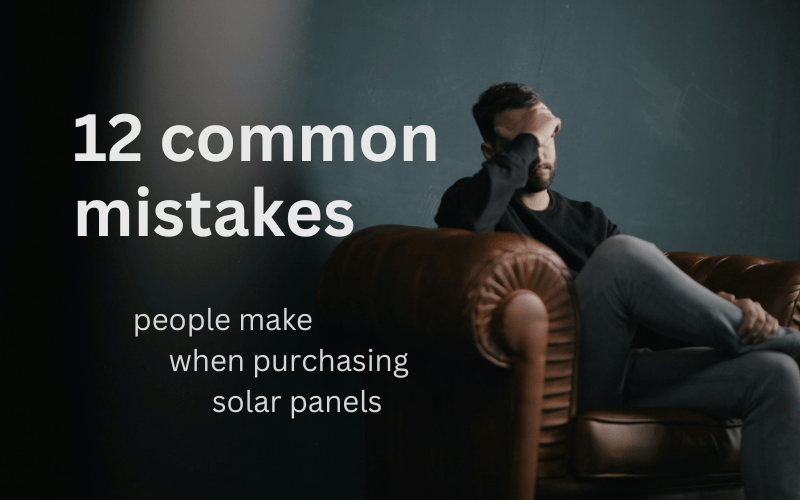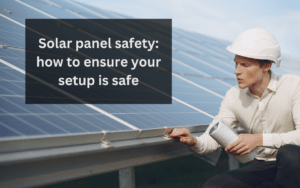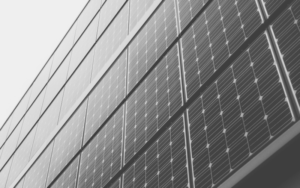Considering solar panels for your home is a smart move, but it’s crucial to approach this decision with the right knowledge. Today, we’re tackling the 12 solar panel mistakes that could potentially derail your investment.
This guide isn’t meant to deter you; rather, it’s designed to arm you with the essential insights needed to navigate common pitfalls effectively. From overspending to choosing incompatible equipment, we’ll cover the key areas where solar panel mistakes are often made. Our goal is to ensure you make a well-informed transition to solar energy, avoiding common errors that could compromise your system’s efficiency and value.
Let’s dive right in and uncover the 12 solar panel mistakes you need to avoid to make an informed purchase!
12 Solar Panel Mistakes to Avoid
- 1. Not Assessing Energy Needs Accurately
- 2. Overlooking the Quality for Price
- 3. Neglecting Installation Conditions
- 4. Overlooking Incentives and Financing
- 5. Failing to Vet Installers
- 6. Overlooking Roof Condition Prior to Installation
- 7. Neglecting Permit and Planning Permissions
- 8. Ignoring Maintenance and Warranty Terms
- 9. Choosing Incompatible Equipment
- 10. Skipping a Professional Home Energy Audit
- 11. Not Planning for the Future
- 12. Not Getting Multiple Quotes
1. Not Assessing Energy Needs Accurately
Accurately determining your home’s energy requirements is essential to avoid overspending on an oversized solar system or being underserved by one that’s too small. Begin by reviewing your past utility bills, focusing on your monthly and annual kWh usage to understand your average energy consumption.
Consider any future changes, such as home additions or purchasing an electric vehicle, which could increase your energy needs. Utilise online solar calculators for a rough estimate, but consult with a professional for a detailed assessment. Implementing energy-saving measures beforehand, like upgrading to energy-efficient appliances, can also reduce your overall energy needs and the size of the solar system required.
This approach ensures a tailored solar solution that matches your actual energy consumption, maximizing both the efficiency and cost-effectiveness of your investment.

2. Overlooking the Quality for Price
One of the common solar panel mistakes is choosing solar panels based solely on their more affordable price. This can lead to increased costs in the long run due to lower efficiency and durability. High-quality solar panels from reputable manufacturers may have a higher upfront cost but offer better long-term value through increased energy production and a longer lifespan. Look for panels with high efficiency ratings and robust warranties that cover performance and manufacturing defects for 20-25 years. Research manufacturers, read customer reviews, and seek recommendations from trusted solar installers to find reliable panels that offer the best return on investment.
Remember, investing in quality not only maximises your system’s output, but also ensures its durability against environmental challenges.
3. Neglecting Installation Conditions
The performance of solar panels is significantly influenced by their installation conditions. Factors such as roof orientation, angle, and potential shading from trees or buildings can impact the amount of sunlight your panels receive. Work with a professional installer to conduct a thorough site assessment before installation. They can recommend the optimal placement and orientation for your panels, ensuring maximum sunlight exposure and energy production.
Addressing these conditions beforehand can prevent suboptimal performance, and ensure your solar system operates at peak efficiency.

4. Overlooking Incentives and Financing
Many homeowners miss the opportunity to lower their solar panel costs through available incentives, rebates, and financing options. Wherever you live, be sure to research national and local incentives that can significantly reduce the upfront cost of solar installation. (For UK homeowners, see this article by The Independent.)
These may include tax credits, rebates, and solar renewable energy certificates (SRECs). Financing options, such as solar loans or leases, can also make going solar more accessible by spreading the cost over time. Take the time to explore all available financial benefits to maximise your savings and make your solar investment more affordable.
5. Failing to Vet Installers
Sadly, one of the most commonly seen solar panel mistakes is failing to do proper vetting of your installers. The success of your solar system heavily depends on the quality and expertise of your installer. Choosing an inexperienced or poorly-reviewed installer can lead to numerous problems, from inefficient setup to potential damage to your roof. Research and select a certified installer with a strong track record and positive customer reviews. Ask for references and examples of previous installations to assess their expertise.
A reputable installer not only ensures a smooth and efficient installation process but also provides valuable insights on the best system for your needs, considering your home’s specifics and local regulations.

6. Overlooking Roof Condition Prior to Installation
The condition of your roof is a fundamental aspect to consider before installing solar panels. An aging or damaged roof may need replacement soon, and installing solar panels only to remove and reinstall them shortly after is both costly and inconvenient. Before proceeding with solar installation, have a professional evaluate the condition of your roof. If necessary, make repairs or consider a full replacement. This pre-emptive step not only secures your investment but also avoids the hassle and additional costs associated with retrofitting solar panels on a roof that’s not fit for the long haul.
7. Neglecting Permit and Planning Permissions
Solar panel installations can be subject to various local regulations, including the need for permits or planning permissions. This is particularly relevant for installations in conservation areas, on listed buildings, or where the system’s size exceeds certain thresholds. Failing to comply with these regulations can lead to fines and the requirement to modify or remove your system.
Start by consulting with your local building department or a knowledgeable solar installer to understand the specific requirements for your area. They can guide you through the permitting process, ensuring your installation complies with all local codes and regulations, thereby avoiding legal issues and ensuring a smooth project execution.
8. Ignoring Maintenance and Warranty Terms
Understanding and adhering to your solar panels’ maintenance requirements and warranty terms is vital for ensuring their longevity and efficiency. Some homeowners neglect this aspect, potentially affecting the system’s performance and voiding the warranty. Regular maintenance tasks, such as cleaning the panels and checking for obstructions, can significantly impact energy production. Before purchasing, scrutinise the warranty details to know what’s covered, including performance guarantees and protection against manufacturing defects.
Choosing panels with a robust warranty and following through with recommended maintenance can safeguard your investment and ensure your system operates optimally for years to come.

9. Choosing Incompatible Equipment
One critical mistake often overlooked is selecting incompatible equipment for your solar panel system. This mistake can lead to a significant decrease in system efficiency and even risk damaging your setup. Key components like inverters and batteries must be compatible not only with your solar panels but also with each other. For instance, choosing an inverter that cannot handle the output of your solar panels can bottleneck your system’s energy production. Similarly, opting for a battery storage system that isn’t suited to your inverter’s specifications can lead to underutilisation of stored energy or, worse, shorten the lifespan of your equipment.
To avoid this pitfall, thoroughly research and consult with professionals about the best equipment that works seamlessly together. Paying close attention to the technical specifications and seeking systems designed to integrate well can save you from efficiency losses and unexpected costs down the line. Ensuring your solar panels, inverter, and batteries are a match made in heaven is essential for a smooth, productive solar energy experience.
10. Skipping a Professional Home Energy Audit
Before installing solar panels, conducting a professional home energy audit can reveal significant insights into your home’s energy efficiency. Skipping this step can lead to an oversized or inefficient solar system, as the audit identifies opportunities to reduce energy consumption through improvements like better insulation or more efficient appliances. Implementing these recommendations can lower your overall energy needs, allowing for a smaller, more cost-effective solar installation.
Hiring a certified energy auditor to perform a thorough assessment ensures your solar system is accurately sized for your home, maximising both energy savings and environmental benefits.

11. Not Planning for the Future
Solar panel installations are long-term investments, making it crucial to consider future energy needs. Homeowners often overlook potential changes, like family size increasing, purchasing an electric vehicle, or expanding their living space, all of which can raise energy consumption. When designing your solar system, factor in these potential changes to avoid needing costly upgrades later.
Avoid this common solar panel mistake by discussing your plans and anticipated energy needs with your solar installer to ensure your system can scale or adapt to future requirements, securing its relevance and efficiency as your energy demands evolve.
12. Not Getting Multiple Quotes
Finally, the last of these 12 Solar Panel Mistakes is not obtaining multiple quotes for the installation. This oversight can lead to paying more than necessary or settling for a system that doesn’t best suit your needs. Solar panels and installation costs can vary widely between providers, as can the expertise and services offered. Requesting quotes from several reputable installers allows you to compare prices, panel types, and services, ensuring you receive the best value and system configuration. Additionally, it provides leverage in negotiations, potentially securing a more favourable deal.
Always ensure that the quotes are comprehensive, covering all aspects of the installation, including equipment, labour, warranties, and after-sales service, to make an informed decision.

Conclusion
In wrapping up, avoiding these 12 solar panel mistakes can significantly impact the success of your transition to solar energy. From choosing incompatible equipment to neglecting the importance of proper installation, each mistake carries the potential to undermine your investment.
By keeping these solar panel mistakes in mind and approaching your solar journey with informed caution, you can ensure a smoother, more efficient, and cost-effective solar experience. Remember, knowledge is power, especially when it comes to sidestepping common solar panel mistakes and embracing clean, renewable energy with confidence.
Want more info on solar panels? Check out our Common Solar Myths Debunked or take our Spot the Solar Challenge!





